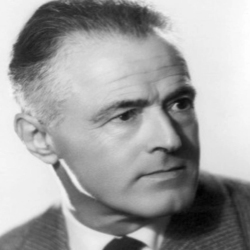
Ugo Betti
| Date of Birth | : | 04 Feb, 1892 |
| Date of Death | : | 09 Jun, 1953 |
| Place of Birth | : | Camerino, Italy |
| Profession | : | Playwright, Poet |
| Nationality | : | Italian |
Ugo Betti was an Italian judge, better known as an author, who is considered by many the greatest Italian playwright next to Pirandello.
Biography
Educated for the law, Betti fought in World War I and while imprisoned (1917–18) by the Germans wrote a volume of poems, Il re pensieroso (1922; “The Thoughtful King”). After the war he became a magistrate in Rome in 1920, rose to a judgeship in 1930, and became librarian at the Ministry of Justice in 1944. His legal career was interspersed with the writing of two more volumes of poetry, three books of short stories, a novel, much miscellaneous writing, and, most important, 26 plays.
His first play, La padrona (first performed 1927; “The Landlady”), drew mixed reactions, but later successful plays include Frana allo scalo Nord (first performed 1933; Eng. trans., Landslide, 1964), the story of a natural disaster and collective guilt; Delitto all’Isola delle Capre (first performed 1950; Eng. trans., Crime on Goat Island, 1960), a violent tragedy of love and revenge; La regina e gli insorti (first performed 1951; Eng. trans., The Queen and the Rebels, 1956), a strong argument for compassion and self-sacrifice; and La fuggitiva (first performed 1953; Eng. trans., The Fugitive, 1964), a story presenting legal courts as a symbol of world salvation. Corruzione al palazzo di giustizia (first performed 1949; Eng. trans., Corruption in the Palace of Justice, 1962) depicts an unscrupulous judge who, having clawed his way to the presidency of the Supreme Court, realizes his own guilt and gives himself up for trial.
International attention, offsetting lukewarm popular and critical acclaim in Italy, came with Paris productions in the early 1950s of his plays, which were then translated into English.
Death
died June 9, 1953, Rome.
Quotes
All of us are mad. If it weren't for the fact that every one of us is slightly abnormal, there wouldn't be any point in giving each person a separate name.
Each of us is the only person who can give the other what each of us wants to have: Peace.
Every tiny part of us cries out against the idea of dying, and hopes to live forever.
Justice! Custodian of the world! But since the world errs, justice must be custodian of the world's errors.
Nobody is bound by any obligation unless it has first been freely accepted.
If we have anything kind to say, any tender sentiment to express, we feel a sense of shame.
Murderers, in general, are people who are consistent, people who are obsessed with one idea and nothing else.
We cannot bear to regard ourselves simply as playthings of blind chance, we cannot admit to feeling ourselves abandoned.
When I say "I," I mean a thing absolutely unique, not to be confused with any other.
The first temptation, upon meeting an old friend after many years, is always to - look the other way.
